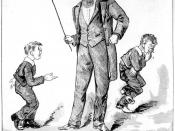To Encourage or Punish? Without discipline, there is chaos. Without orderliness, learning cannot occur(Simmons 70). Classroom disruption is being recognized by both conservative politicians and the American Federation of Teachers, as a key problem in schools. More and more teachers are resorting to punishment to solve these problems. Advocates of punishment believe it is a more effective method than encouragement to increase patience in studying. But when is the use of punishment necessary and when is it enough? Critics of punishment believe that when rules are clear and consequences are straight forward, children learn the importance of inner control, as well as the values of trust, respect, and civility(Wolfgang 152). Either way, the question surrounding punishment in schools is: to punish or not to punish? Believers of punishment argue that there are many positive effects of punishment. Directing his argument at parents and teachers Chung-ceng Lin argues that Punishment is a more effective method than encouragement to increase child diligence in studying(Lin 46).
Although educators and psychologists persistently support encouragement rather than punishment for childrens education, many teachers and parents often argue punishment is more effective. Again, Lin, an authority in child education, says, Children will be misbehave more if they are rewarded with benefits regardless of their behavior in the classroom. Children will devote more time in studying if both parents and teachers increase their scholastic performance standards to avoid punishment.
An educator's right to use corporal or physical punishment has usually been attributed to the notion that when the child is in school, the educator stands in place of the parents. The educator assumes that he has complete control of the situation and the child. The teacher may warn the child first when the child misbehaves. When the child continues to misbehave, the educator may then resort to...


